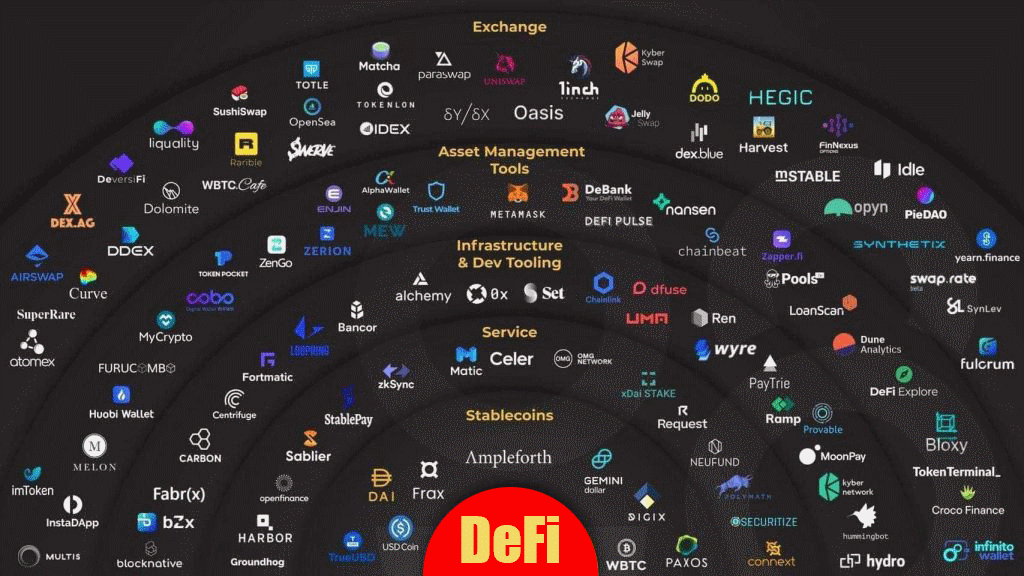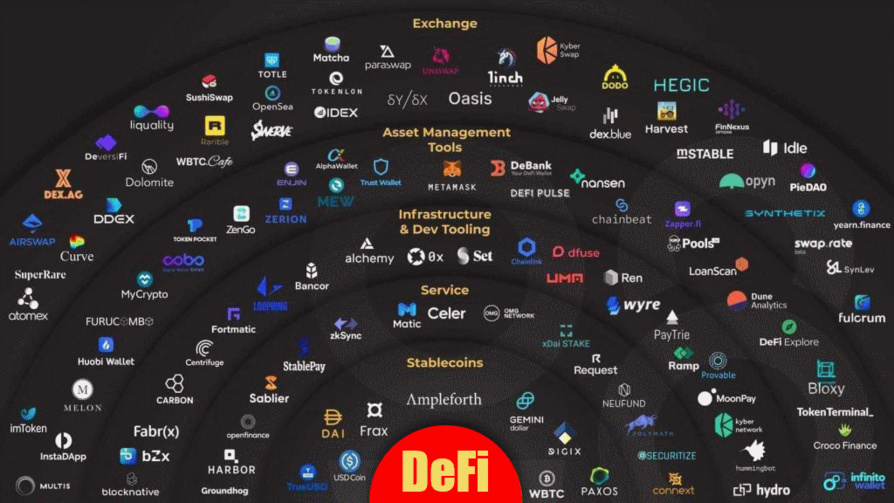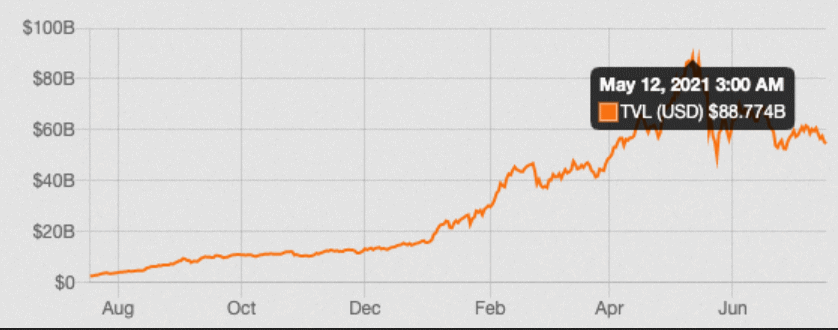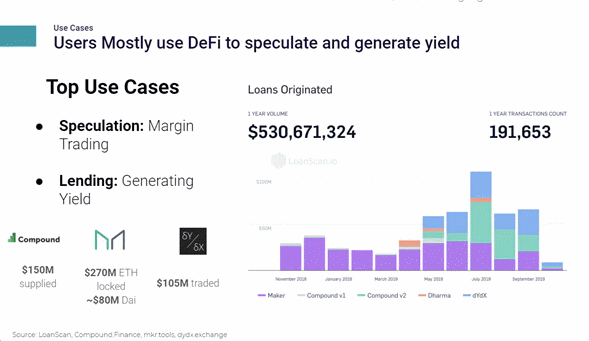IMAGE SOURCE
In the financial world, 2021 will likely be remembered for two things. First, it was the year that Bitcoin began to gain traction, with a growing number of major financial institutions, huge technology corporations, and even a government signing on. Second, it’s the year DeFi’s value exploded, rising from less than $1 billion to $88 billion, since May 2020. More importantly, DeFi gets rid of the necessity for centralized regulated money custodians and creates a new system based on transparency, democracy, and seemingly limitless mobility.
Investors have poured record amounts of money into DeFi applications that are replicating traditional financial products on decentralized blockchain infrastructure, drawn by the high profits offered by lending, borrowing, decentralized trading, and synthetics protocols.
The most common metric to measure the growth of DeFi is Total Value Locked (TVL) which is the amount of funds locked into all DeFi protocols. According to DeFi Pulse, In May 2020, TVL was around $900 million, and a year later it peaked at over $88 billion across all blockchains.
In the financial world, 2021 will likely be remembered for two things. First, it was the year that Bitcoin began to gain traction, with a growing number of major financial institutions, huge technology corporations, and even a government signing on. Second, it’s the year DeFi’s value exploded, rising from less than $1 billion to $88 billion, since May 2020. More importantly, DeFi gets rid of the necessity for centralized regulated money custodians and creates a new system based on transparency, democracy, and seemingly limitless mobility.
Investors have poured record amounts of money into DeFi applications that are replicating traditional financial products on decentralized blockchain infrastructure, drawn by the high profits offered by lending, borrowing, decentralized trading, and synthetics protocols.
The most common metric to measure the growth of DeFi is Total Value Locked (TVL) which is the amount of funds locked into all DeFi protocols. According to DeFi Pulse, In May 2020, TVL was around $900 million, and a year later it peaked at over $88 billion across all blockchains.
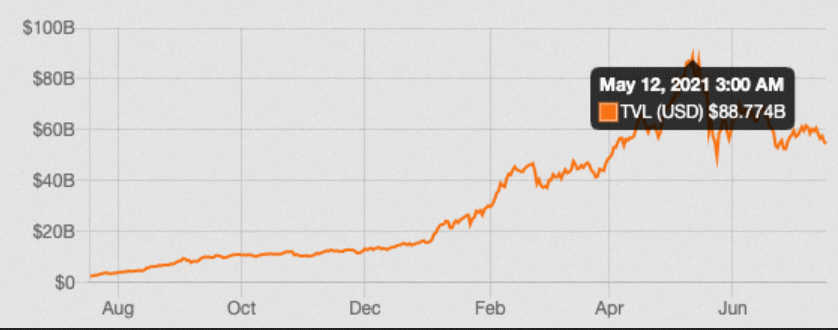
According to Messari, trade volumes on decentralized exchanges have increased by more than 8,000% since 2020. The number of DeFi users has grown tenfold when compared to Q1 2020, and the supply of stablecoins has increased by 7x, based on Consensys.
According to Dapp Radar, DeFi is now offering deposit rates as high as 8% for new customers. When you compare with DeFi, interest rates on bank deposits now are close to zero percent, and in some cases are even negative, particularly in Europe. There are just two European Union members with interest rates above one percent: Croatia (2.5%) and Romania (1.25%), whereas all other nations in the Eurozone have rates of zero percent or less. In the US, the national average interest rate for savings accounts is 0.06 percent, with the highest rate available being 0.7 percent annual percentage yield, based on data from Investopedia.
Because of the inherent volatility of cryptocurrencies, stablecoins are a form of DeFi activity that carries a lower level of user-facing risk as compared to other alternatives. Deposits in stablecoins can earn anywhere from 3-4% interest per year to as much as 40% interest each year depending on the provider. In April 2021, the cryptocurrency exchange Binance announced that it was willing to pay up to 37.36% of its trading volume in USDC.
According to Dapp Radar, DeFi is now offering deposit rates as high as 8% for new customers. When you compare with DeFi, interest rates on bank deposits now are close to zero percent, and in some cases are even negative, particularly in Europe. There are just two European Union members with interest rates above one percent: Croatia (2.5%) and Romania (1.25%), whereas all other nations in the Eurozone have rates of zero percent or less. In the US, the national average interest rate for savings accounts is 0.06 percent, with the highest rate available being 0.7 percent annual percentage yield, based on data from Investopedia.
Because of the inherent volatility of cryptocurrencies, stablecoins are a form of DeFi activity that carries a lower level of user-facing risk as compared to other alternatives. Deposits in stablecoins can earn anywhere from 3-4% interest per year to as much as 40% interest each year depending on the provider. In April 2021, the cryptocurrency exchange Binance announced that it was willing to pay up to 37.36% of its trading volume in USDC.
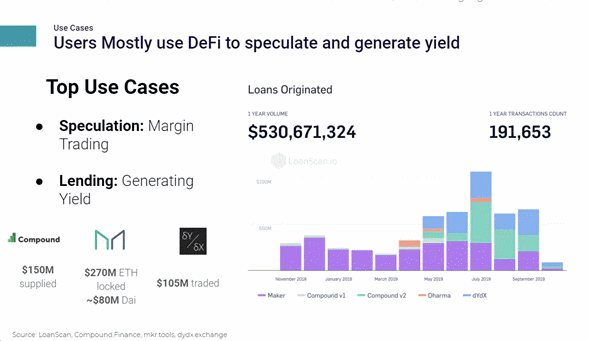
With every metric screaming DeFi’s phenomenal growth, what’s next?
Jack Dorsey, Square’s CEO, last Thursday posted on Twitter that the company is “focused on building an open developer platform with the sole goal of making it easy to create non-custodial, permissionless, and decentralized financial services.” Square is the bank of the future and this announcement is a huge validation for Bitcoin DeFi.
When it comes to DeFI, there are two kinds of organizations in the world right now: those who believe and support it and those who fight it. Banks being banks are fighting hard to defend their turf. But DeFi provides a significant opportunity for banks to avoid past mistakes. Banks can now create credible and trustworthy paths between the centralized financial services and the new global order of DeFi, and should use their weight and resources to build these trusted pathways.
Cryptocurrency players such as Coinbase have been at the forefront of any substantial efforts to build a bridge between traditional finance and cryptocurrencies. There is no reason why big banks could not follow suit and provide similar offerings to clients interested in bitcoin trading with a broader range of platforms to choose from.
Some other banks are making moves in the right direction.
JP Morgan Chase became one of the first financial institutions to test the use of its own JPM digital coin in an actual real-world setting after enabling crypto trading in 2017. BBVA recently launched its first bitcoin transaction and custody service and Revolut has enabled crypto trading since 2017 and has recently added dogecoin to its offering.
It is possible that DeFi could completely transform the global financial system by eliminating transaction costs and ramping up the battle for next-generation efficiency and speed, among other things. DeFi increases security, lowers transaction costs and does away with middlemen or banks to operate.
What this basically means is that DeFi isn’t merely yet another unwelcome disruption for incumbent banks, it’s an existential threat. Unless incumbents don’t want to become the banking industry’s Blockbuster Video, it would make a lot of sense to let go of the brakes and embrace DeFi.
Years ago, we use to banks to open bank accounts, get loans, and other financial services. As fintech companies grew, we started to do a lot of these things through our mobile phones. Now with DeFi in the picture, fintech companies can reach the next level in their evolution, using blockchain to improve their financial services.
DeFi is borderless, anyone with a smartphone and Internet access can use it. It’s secure and transparent because it uses blockchain technology. Interest rates are purely determined by supply and demand, without an organization or a government being able to set rates.
DeFi is the future of finance because it solves problems that traditional finance cannot. This is just the beginning and as DeFi matures even more, we will see services from one blockchain interact with other services on different networks.
Jack Dorsey, Square’s CEO, last Thursday posted on Twitter that the company is “focused on building an open developer platform with the sole goal of making it easy to create non-custodial, permissionless, and decentralized financial services.” Square is the bank of the future and this announcement is a huge validation for Bitcoin DeFi.
When it comes to DeFI, there are two kinds of organizations in the world right now: those who believe and support it and those who fight it. Banks being banks are fighting hard to defend their turf. But DeFi provides a significant opportunity for banks to avoid past mistakes. Banks can now create credible and trustworthy paths between the centralized financial services and the new global order of DeFi, and should use their weight and resources to build these trusted pathways.
Cryptocurrency players such as Coinbase have been at the forefront of any substantial efforts to build a bridge between traditional finance and cryptocurrencies. There is no reason why big banks could not follow suit and provide similar offerings to clients interested in bitcoin trading with a broader range of platforms to choose from.
Some other banks are making moves in the right direction.
JP Morgan Chase became one of the first financial institutions to test the use of its own JPM digital coin in an actual real-world setting after enabling crypto trading in 2017. BBVA recently launched its first bitcoin transaction and custody service and Revolut has enabled crypto trading since 2017 and has recently added dogecoin to its offering.
It is possible that DeFi could completely transform the global financial system by eliminating transaction costs and ramping up the battle for next-generation efficiency and speed, among other things. DeFi increases security, lowers transaction costs and does away with middlemen or banks to operate.
What this basically means is that DeFi isn’t merely yet another unwelcome disruption for incumbent banks, it’s an existential threat. Unless incumbents don’t want to become the banking industry’s Blockbuster Video, it would make a lot of sense to let go of the brakes and embrace DeFi.
Years ago, we use to banks to open bank accounts, get loans, and other financial services. As fintech companies grew, we started to do a lot of these things through our mobile phones. Now with DeFi in the picture, fintech companies can reach the next level in their evolution, using blockchain to improve their financial services.
DeFi is borderless, anyone with a smartphone and Internet access can use it. It’s secure and transparent because it uses blockchain technology. Interest rates are purely determined by supply and demand, without an organization or a government being able to set rates.
DeFi is the future of finance because it solves problems that traditional finance cannot. This is just the beginning and as DeFi matures even more, we will see services from one blockchain interact with other services on different networks.

Ilias Louis Hatzis
Ilias Louis Hatzis is the Founder & CEO at Mercato Blockchain Corporation AG.
Ilias Louis Hatzis is the founder and CEO at Kryptonio wallet. Create your wallet in less than a minute, without seed phrases, private keys, passwords or documents. Keep your bitcoin and digital assets always secure and recoverable: https://kryptonio.com
I have no positions or commercial relationships with the companies or people mentioned. I am not receiving compensation for this post.
Ilias Louis Hatzis is the founder and CEO at Kryptonio wallet. Create your wallet in less than a minute, without seed phrases, private keys, passwords or documents. Keep your bitcoin and digital assets always secure and recoverable: https://kryptonio.com
I have no positions or commercial relationships with the companies or people mentioned. I am not receiving compensation for this post.
Autres articles
-
Revolut obtient une licence bancaire au Royaume-Uni
-
Nominations | Eight Advisory annonce deux nouveaux associés en France
-
NFT : L'Opéra de Paris dévoilera à la rentrée une nouvelle collection d'art numérique
-
WEB3 : L'Europe, le baby-blues des licornes ?
-
Finyear, partenaire média de la prochaine édition de l'IPEM Paris





